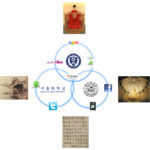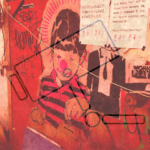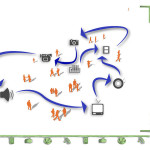I recently completed my thesis (as in I just sent in the revised version yesterday) so I now have a PhD from University College London. Or at least it will be official once all the paperwork is done, but that is more or less out of my hands at this point. Long journey that will form the content of subsequent posts, I have no doubt, as the dust begins to settle and I begin to reflect on what this experience has meant to me, what I would do differently, and all the takeaways emerging from the normal sequence of reflective practice.
What I am presenting here is merely a link to the completed work, the abstract, and then below that a bit of media from my journey along the way. None of this media actually made it into the actual thesis, but it was part of the journey so I look fondly on it. It is remarkable how much of what we do as researchers and academics (and teachers) never sees the light of day. But it shapes how the light sees that which does get out there.
- Gallagher, M. (2016). Charting Trajectories on the Peripheries of Community Practice: Mobile Learning for the Humanities in South Korea. Unpublished doctoral thesis. Institute of Education, University College London, Department of Culture, Communication and Media.
“This research explores the learning practices of graduate humanities students in South Korea as evidenced through mobile technology. Fieldwork was carried out with 25 graduate students across several universities in Seoul involving interviews, mobile artifacts, and reflective prompts. The study asked how graduate students use mobile technology to support their learning, what learning practices are presented in this mobile technology use, and whether this combination of mobile technology use and learning practice suggest a learner trajectory (Wenger, 1998) in respect to the disciplinary community.
Analysis presents the trajectories being evidenced by these graduate students, leading to a discussion on how graduate students are shaping their learning practices and participation in the humanities through mobile technology. Findings suggest the trajectories that graduate students exhibit in relation to their disciplinary communities are structured by mobile technology itself, informal and formal practices consistent with community participation, and South Korean sociocultural practice. Trajectories presented were complex aggregations of adherence, subversion, and intent, suggesting that participation in the disciplinary community was shaped by practices drawn from multimemberships and individualized practice.
The findings suggest that more robust methodologies are needed to account for the complexity of learning trajectories in sociocultural contexts. The contributions of this thesis are a more sophisticated definition of mobile learning, methodological models that allow for this definition to be evidenced, an analytical framework that coheres the disparate data points being evidenced through mobile technology, and a more holistic presentation of mobile learning than has been presented in research on South Korean higher education.”



















My thesis: #mLearning in South Korean higher education. https://t.co/ycrlrlvbPp #Seoul #UCL https://t.co/B1McRrowkZ
[…] This research is about the learning practices of graduate humanities students in South Korea as evidenced through mobile technology . Fieldwork was carried out with 25 graduate students across several universities in Seoul involving interviews, mobile artifacts, and reflective prompts . The study asked how graduate students use mobile technology to support their learning, what learning practices a re presented in this mobile technology use, and whether this combination of mobile technology use and learning practice suggest a learner trajectory (Wenger, 1998) in respect to the disciplinary community. Analysis presents the trajectories being evidenc ed by these graduate students, leading to a discussion on how graduate students are shaping their learning practices and participation in the humanities through mobile technology. Findings suggest the trajectories that graduate students exhibit in relation to their disciplinary communities are structured by mobile technology itself, informal and formal practices consistent with community participation, and South Korean sociocultural practice. Tr ajectories presented were complex aggregations of adherence, su bversion, and intent, suggesting that participation in the disciplinary community was shaped by multimemberships and individualized practice. The findings suggest that more robust methodologies are needed to account for the complexity of learning trajector ies in sociocultural contexts . The contributions of this thesis are a more sophisticated definition of mobile learning, methodological models that allow for this definition to be evidenced, an analytical framework that coheres the disparate data points bei ng evidenced through mobile technology, and a more holistic presentation of mobile learning than has been presented in research on South Korean higher education. […]
My thesis: #mLearning in South Korean higher education. https://t.co/mI3uoFNV8K https://t.co/Dr1pMGKNet
RT @mseangallagher: My thesis: #mLearning in South Korean higher education. https://t.co/mI3uoFNV8K https://t.co/Dr1pMGKNet